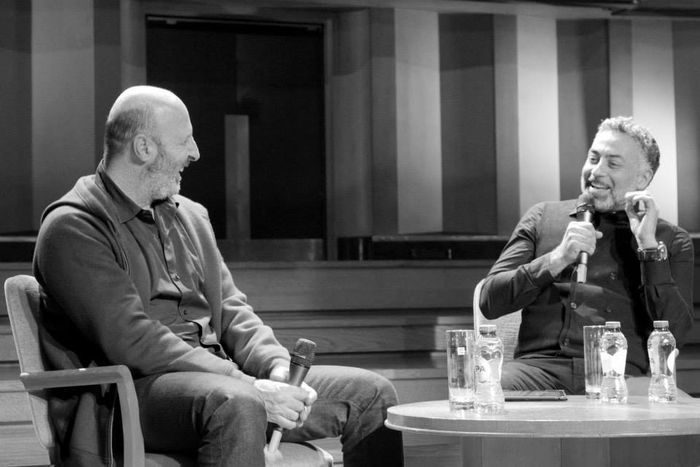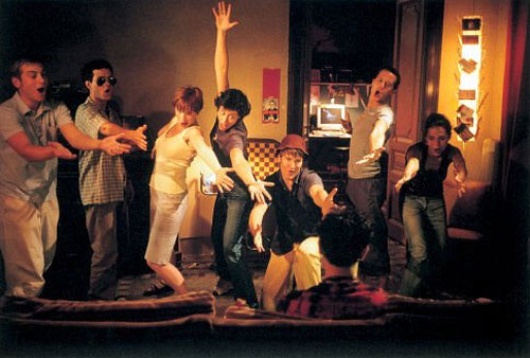
THE EUROPEAN UNION LOOKS LIKE MY “SPANISH APARTMENT”
Published on
Translation by:
Anna CavedonThe Bruxelles’ Bozart room, where the master class of Cédric Klapisch took place on the 18th of March, was full of people from different generations, as was the case in his trilogy of the Erasmus generation (“The Spanish Apartment”, “Russian Dolls” and “Chinese Puzzle”).
At the very beginning, Klapisch didn’t have in mind the production of a sequel to “The Spanish Apartment”, but apparently, after all the people that asked for it, he was convinced. As he left them with bated breath with Xavier’s final phrase “ Everything started here”, he decided to start his second work exactly from there.
During the 8 years it took to create the sequel, the destiny of the different characters has changed. Together with that of Europe and the World.
The Spanish Apartment” (2002) Official trailer
THE SPANISH APARTMENT IS THE ONLY FILM THAT TALKS ABOUT EUROPE
When Klapisch presented the first film of the trilogy to the European Commission, he realized that it was surprisingly alike to “Spanish apartment”. A striking example of this is the translators that make up a veritable Babel tower, and serving as an example of the ethnic and cultural mix that is fundamental to our cultural globalization.
The point of this trilogy, named by Klapisch “Xavier’s travels”, is to describe the genesis of globalization. In the second film “Russian Dolls” he talks about European borders and in the final installment, “Chinese Puzzle”, he transcends these national borders and talks about real globalization, the one that comes from China.
Mobility is another important issue he deals with in his trilogy. The mobility that has been unsettling our lives for more than 30 years, regardless of whether is caused by internet, high-speed trains or television,.
The more we travel, as his characters do, the more we focus our attention on the “other”, and Bruxelles is an outstanding example: “Here there is a real and positive desire of living together. And this is only the beginning”.
Klapisch, when he was a 23-year-old student, went to New York, the city where he realized what it was to be a European citizen. And more specifically, where he learned to sing “Bella ciao” with his italian friends.
The cinema of the “Disunited States of Europe”
The European Commission’s President, Barroso, has recently affirmed that culture (considered as dance,
 cinema, art, etc.) is not like the other goods, because of its non-profitable peculiarity. “It’s true” says the director “but what he’s saying is anti-cultural, because culture is not a mere commodity”. European cinema needs some brave and creative policy-makers, and, especially today, it should be helped and protected, just as Jean Monnet did in 1946 when he supported the creation of CNC ( Centre National du Cinéma et de l’Image Animée).
cinema, art, etc.) is not like the other goods, because of its non-profitable peculiarity. “It’s true” says the director “but what he’s saying is anti-cultural, because culture is not a mere commodity”. European cinema needs some brave and creative policy-makers, and, especially today, it should be helped and protected, just as Jean Monnet did in 1946 when he supported the creation of CNC ( Centre National du Cinéma et de l’Image Animée).
From Klapisch’s point of view , European cinema is very hard to define, and to do so is to circumscribe to an extent. Europe could be called “The Disunited States”, because of its cultural and linguistic differences. This is simultaneously its strength and its weakness, but this doesn’t prevent from having a real italian, spanish or belgian film. Here in Europe, what is hard is to improve distribution, he says, and for that purpose, we need to consider that now marketing is no less important than the quality of a film.
“Would Xavier be an unemployed 40-year-old man without future today?”
“We lack courage” states Klapisch “and if we keep talking about unemployment, people will never have the chance to grow and become someone”
“I believe in Europe. And even if we all know there are some things that need changing, I think it’s better for us to stay together”.
Finally, when asked the question on everyone’s lips, that of another film, the director answered: “we’ll see in 10 years”.
The master class was moderated by Domenico La Porta, the editor-in-chief of Cineuropa, it was organised by the Association des auteurs audiovisuels and Europa Distribution, and supported by Prix LUX
Translated from L’Unione Europea assomiglia al mio “Appartamento Spagnolo”



